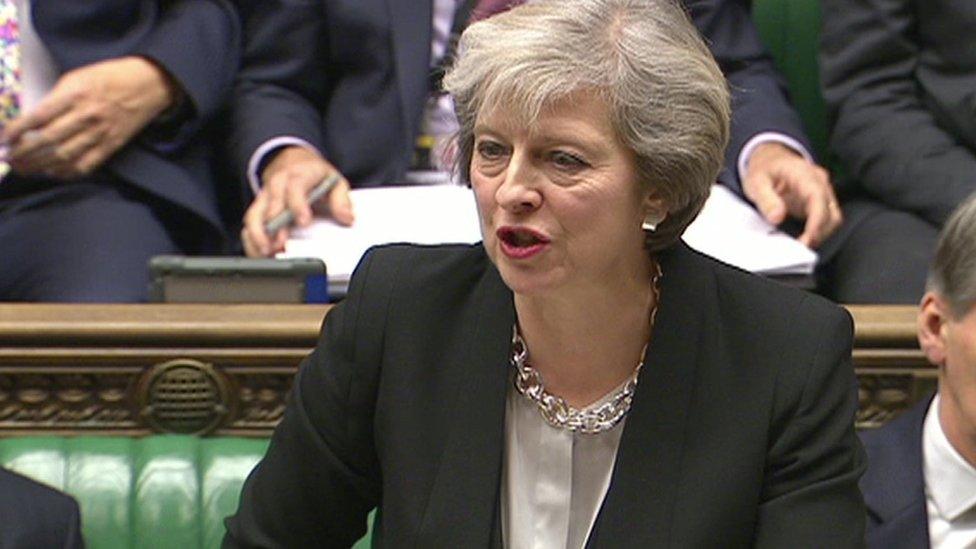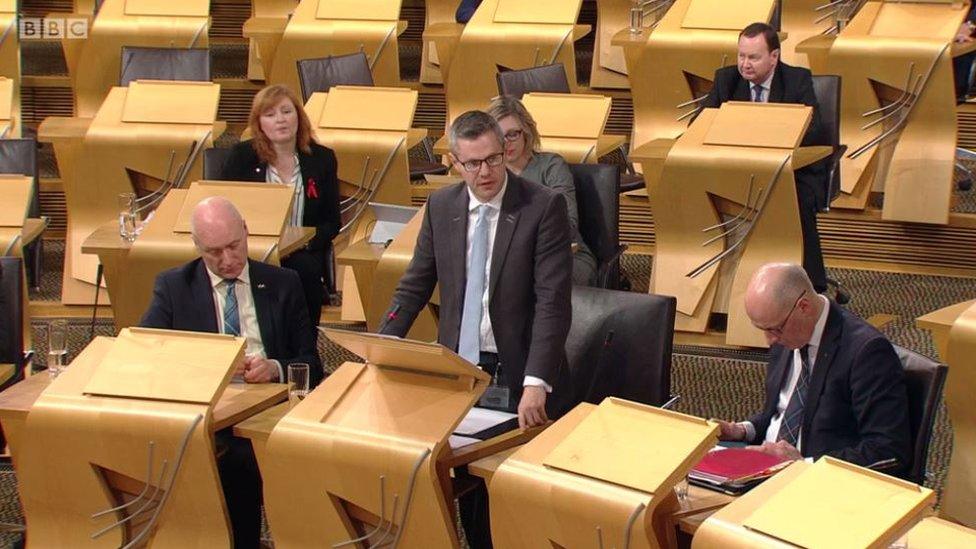St Andrew's Day at Whitehall and Holyrood
- Published

Theresa May wished the whole world a happy St Andrews Day
From behind the Prime Minister, a voice could plainly be heard: sibilant yet insistent. Sshh, said the voice.
The implication being that the House should fall silent to hear the ensuing pronouncement from the PM.
Smiling broadly, Theresa May then wished the people of the United Kingdom and indeed the entire planet a happy St Andrew's Day.
Given the Caledonian topic, perhaps our sibilant silencer should have said "wheesht" instead. The element of linguistic surprise might have added to the effectiveness.
Never one to miss an opportunity, the Scottish Secretary played up the patron saint's day. To emphasise the moment, there was a piper playing outside the magnificent premises of the Scotland Office in London's Whitehall.
Scottish produce
As an aside, I might note that I have always enjoyed visiting Dover House. The staircase with the heavy rope - used by the lame Lord Byron to haul himself up to yet another mischievous encounter with Lady Caroline Lamb, then in residence.
The bust of Sir Walter Scott at the top of that staircase - Scott whom Byron enthusiastically eulogised, adding: "I long to get drunk with him."
Anyway, enough of these architectural and literary by-ways. Inside those self-same Scotland Office premises, there was today a display of distinctive Scottish produce ranging from Stornoway black pudding to Irn Bru to whisky, gin and sweeties. Quite a party in prospect for the national day.
And David Mundell had chosen this day to transfer tax powers formally from Westminster to Holyrood. You remember, the control over income tax rates and bands as set out in the Smith Commission.

Derek Mackay will set out his Scottish budget plans on 15 December
And was Derek Mackay grateful? Did the finance secretary fall to his knees in thanks for this boon? I thought that might be your answer.
For one thing, Mr Mackay believes in independence (bet that came as a shock). He regards any devolved transfer as but an interim step, a concession wrung from a grudging UK state.
For another, the Finance Secretary has little time these days for paeans of praise. He has to steer his budget - tax powers and all - past Holyrood. Right now, he doesn't have the votes.
On tax, he wants to leave the standard rate alone while declining to emulate the Chancellor who is cutting the tax bill for higher earners by hiking the threshold at which the upper rate kicks in.
As billed here previously, the Opposition parties are all, to varying degrees, in an oppositional mood. The Tories have their new-found status as the Principal Opposition Party - in Capitals - to defend. Plus they don't think folk in Scotland should pay more than in England.
Labour and the Liberal Democrats are standing by their penny for Scotland: increased tax to defend public spending. And the Greens want what they bill as progressive reform: reducing the burden on low earners while increasing the charge for the relatively well-heeled.
Still, Mr Mackay only needs one party to vote with him or abstain. Stand by for the bargaining to begin.